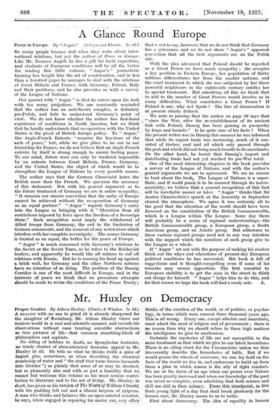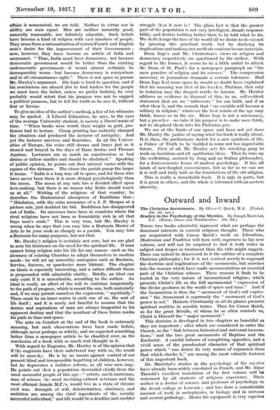Mr. Huxley on Democracy
Proper Studies. By Aldous Huxley. (Chatto & Windus. 7s. 6d.) A REALIST with no axe to grind (it is already sharpened for the slaughter of Socialism), Mr. Aldous Huxley views our _ modern world in a cool and scientific manner, and records his observations without once treating scientific abstractions, as true pictures of life—that common stumbling-block of philosophers and sophists.
No riding of hobbies to death, no Spenglerian fantasies, no 'windy chatter of abracadabrical formulae appeal to ,111r.. Huxley at all. He tells us what- he thinks .(with a spice of - impish glee, sometimes, as when describing the chemical cousinship of water and " the stuff that turns brown barmaids into blondes ") so plainly that some of us may be shocked, but so pleasantly also and with so just a humility that we cannot but welcome this volume as his most serious contri- bution to literature and to the art of living. Mr. Huxley, in short, has given us his version of The World of William Clissold, with the padding left out and a liberal largesse of epigram. A man who thinks and behaves like an open-minded scientist, he says, when engaged in repairing his motor car, very often thinks of the creation of the world, or of politics, or psycho. logy, in terms which were current three thousand years ago. This is all wrong. Every one, except atheists and anarchists; must admit the need of religion and of- government ; there is no reason then why we should retinae to these high matters the intelligence we giVe to mechanism: Certainly the 'mysteries of , life are not susceptible the same treatment as that which we give toeur latest inventions: There is no oiling chart for the Unconsekii-K-utdess we thns irreverently describe the formularies of faith, But if we would grease the wheels of existence, we Can lay hold on the facts of the world we live in, and endeavour to build up from them a plan in which reason is the ally of right conduct. We are at the dawn of an age'tehen our, power over Nature has been greatly increased and when Our knowledge of the past was never so complete, even admitting that both science and skill are still in their infancy. From this standpoint, in thig, fresh young light of a day that shall break gloriously for the human race, Mr. Huxley seems to us to
First about democracy. The idea of equality in human affairs is nonsensical, we are told. Neither in virtue nor in ability are men equal. Men - are - neither naturally good, naturally reasonable, nor infinitely educable. Such- beliefs have become a kind of religion with vast numbers of people. They arose from a rationalization of certain French and English men's desire for the improvement of their Governments ; now, however, they have become an article of faith and sacrosanct. " Theis, India must have democracy, not because democratic government would be better than the existing Undemocratic government—it would almost certainly be incomparably worse—but because democracy is everywhere and in all circumstances right." There is not space to pursue Mr, Huxley's argument. His logic is hard to question, and if his conclusions are absurd (for to find leaders for the people we must have the ballot, unless we prefer bullets), he very probably would retort that his Purpose was not to suggest a political panacea, but to tell the truth as he sees it, Without fear or favour.
To give an idea of the author's method, & few of his whimsies may be quoted. A Liberal Education, he says, in the eyes of the average University student, is merely a liberal waste of time. " When books were worth their weight in gold, pro- fessOrs had to lecture. Cheap printing has radically changed the situation and produced the lecturer of antiquity. And yet the lecturer survives and flourishes. In all the Univer- sities of Europe, his voice still drones and brays just as it droned and brayed in the days of Duns Scotus and Thomas Aquinas. Lecturers are as much an anachronism as bad drains or tallow candles and should be abolished." Speaking of public opinion, he points out that interest varies with the square of the distance. The closer the parish pump the larger it looms. "India is a long way off in space, and for those who have never been there it is more distant psychologically than the moon. The moon at any rate 'has 'a decided effect upon love-making, but there is no reason why India should touch us at all." Writing of the religions of that country, he describes the Brahminical absorption of Buddhism thus : "Hinduism, with the calm assurance- of a 3. P. Morgan at a picture sale, just doubled the bid. Buddhism has disappeared out of India. Its successes have been in countries where the rival- religions have not been so formidably rich in all that buys men's souls." This is very true, but Mr. Huxley is wrong when he says that you may hire a Brahmin Master of Arts to be your cook as cheaply as a pariah. You may hire a Brahmin for many purposes, but not that.
Mr. Huxley's religion is certainly not ours, but we are glad to note his insistence on the need for the spiritual life. If man cannot bring religion into his life for any reason—such as the slowness of existing Churches to adapt themselves to modern needs—he will set up unworthy surrogates such as Business, Service, Success, or quackeries more blatant. The chapter on ideals is especially interesting, and a rather difficult thesis is propounded with admirable clarity. Briefly, an ideal can only exist if it is unrealizable, according to the author. An ideal is really an effort of the will to continue tangentially to the path of progress, which is round the sun, both materially and, if we may permit ourselves the expression, " mystically." There must be an inner centre in each one of us, the seat of life itself ; and it is surely not fanciful to assume that the desires and aspirations of man are always tangential to his apparent deStiny and that the resultant of these forces marks
his path in time and space. - The note on Comfort at the end of the book is extremely amusing, but such observations have been made before, although never perhaps so wittily, and we expected something better than a newspaper article to be chuckled over, as the conclusion of a book with so much real thought in it.
With regard •to Eugenics, Mr. Huxley is of theopinion that if the eugenists have their unfettered way with us, the result will be snare hy. He is by no means against control of our present blind and irresponsible begetting of children, however, but he deprecates a ruthless reform, as all wise men may. He points out that a population descended chiefly from the most successful people of this age—" artists, mathematicians, men of science, the most ravishing cabaret actresses and the most efficient female M.F.'s, would live in a state of chronic civil war. Strength of-will, determination; obstinacy, and ambition are among the chief ingredients of the socially Sutetssful individual," and liksvauld be a deadlier-and madder
struggle than it now is 1 The plain fact is that the greater part of the population is not very intelligent, dreads responsi- bility, and desires nothing better than to be told 'what to do. We shall change the face of the world (if we desire to do so) not by ignoring this practical truth, but by studying its implications and making cur methods conform to our materials.
Dean Inge's and Mr. Chesterton's views on religion and democracy respectively are questioned by the author. With regard to the former, it seems to be a little unfair to attack the Dean of St. Paul's for a newspaper paragraph on "the mere practice of religion and its essence." The compression necessary in journalism demands a certain tolerance. Had Dean Inge had more space he would no doubt have explained that his meaning was that of his teacher, Plotinus, that only in isolation may the deepest trutki be known. Mr. Huxley adduces no evidence in disproof of this, to us, self-evident statement (but are we "introverts " for our faith; and if so what then ?), and the remark that t` no sociable will become a solitary in religion," whatever the best minds of the age may think, leaves us in the air. Dean Inge is not. a missionary, but a preacher—we take it his purpose is to make men think, not to shepherd them into his Plotinian pen.
We are at the limits of our space and have not yet done Mr. Huxley the justice of saying what his book is really about. It is, then, the preliminary sketch for a new synthesis of life, a Palace of Truth to be builded in some not too improbable future. First of all, Mr. Huxley sets his wrecking gang to work on Socialism and all egalitarian ideas. Then he runs up the scaffolding. assisted by Jung and an Italian philosopher, for a ferro-concrete house of modern psychology. It has all kinds of new-fangled conveniences, but as far as we can see it is well and truly laid on the foundations of the old religion.
This is really a remarkable book. It is ugly in parts, but it is great in others, and the whole is informed with an austere sincerity.















































 Previous page
Previous page